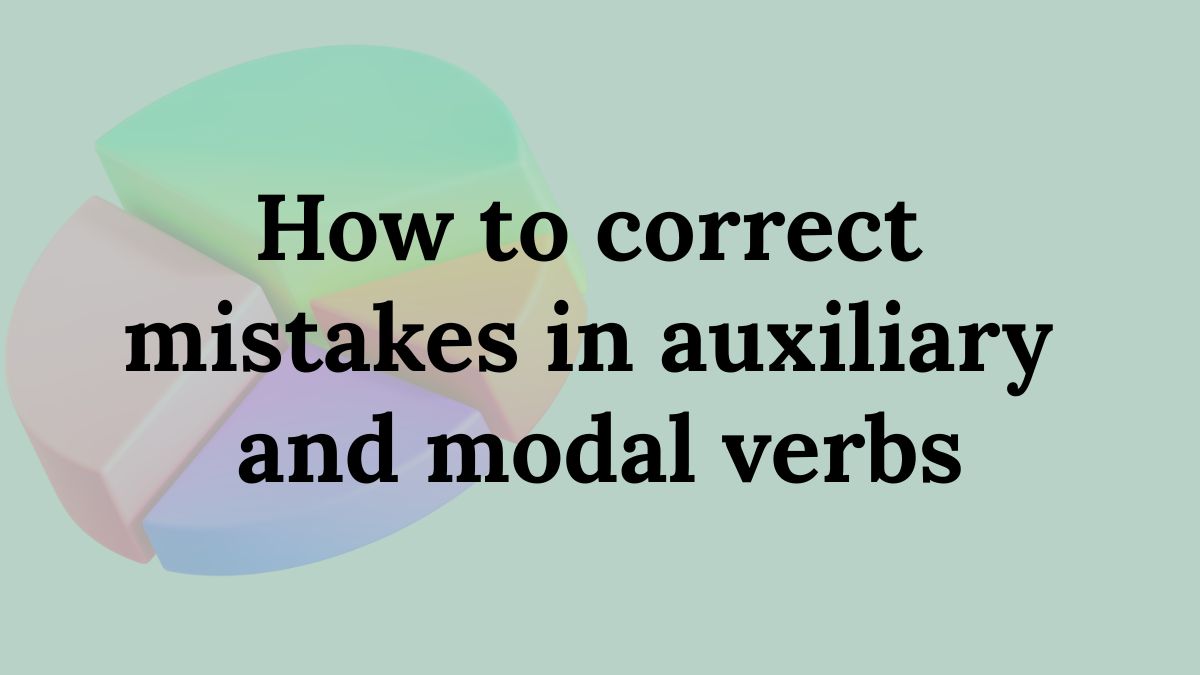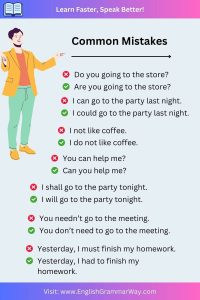Auxiliary and modal verbs are essential in English, helping to form questions, negatives, and different tenses. However, they often cause confusion for learners. In this blog, we’ll explore the most frequent mistakes people make with auxiliary and modal verbs and provide clear explanations on how to correct them.
1. Using “Do” Instead of “Be” in the Present Continuous
- Mistake: Do you going to the store?
- Correct Usage: Are you going to the store?
Explanation: The verb “do” is used for simple present questions, while “be” is needed for continuous tenses. To form the present continuous tense, always use the correct form of “be” (am, is, are) + verb-ing.
More example:
- Mistake: The project did completed on time.
Correct Usage: The project was completed on time. - Mistake: I do like pizza every day.
Correct Usage: I like pizza every day. - Mistake: She not understand the question.
Correct Usage: She does not understand the question. - Mistake: Do you happy with your job?
Correct Usage: Are you happy with your job? - Mistake: I will do a mistake.
Correct Usage: I will make a mistake.
2. Incorrect Use of “Can” and “Could”
- Mistake: I can go to the party last night.
- Correct Usage: I could go to the party last night.
Explanation: “Can” is used for present and future ability, while “could” is the past form of “can.” When referring to a past event, always use “could.”
More example:
- Mistake: When I was a child, I can swim very well.
Correct Usage: When I was a child, I could swim very well. - Mistake: I could speak three languages. (when referring to now)
Correct Usage: I can speak three languages. - Mistake: Can you pass me the salt, please? (In very formal situations)
Correct Usage: Could you pass me the salt, please? - Mistake: It could rain tomorrow. (when making a general weather prediction)
Correct Usage: It can rain tomorrow. - Mistake: If I were taller, I can play basketball professionally.
Correct Usage: If I were taller, I could play basketball professionally.
Read More Article
Common Mistakes with Auxiliary and Modal Verbs
3. Forgetting “Do” in Negative Sentences
- Mistake: I not like coffee.
- Correct Usage: I do not like coffee.
Explanation: In the present simple tense, negatives need “do/does not” before the main verb (except with “be”). Many learners forget to include “do” in negative statements.
More example:
- Mistake: Do you happy with your job?
Correct Usage: Are you happy with your job? - Mistake: I do like pizza every day.
Correct Usage: I like pizza every day.
(Exception: “do” can be used for emphasis: I do like pizza! but not in regular statements.)
4. Misplacing Modal Verbs in Questions
- Mistake: You can help me?
- Correct Usage: Can you help me?
Explanation: In English, modal verbs (can, should, must) should come before the subject in questions. Always invert the order.
More example:
- Mistake: She do her homework every day.
Correct Usage: She does her homework every day. - Mistake: Where you went yesterday?
Correct Usage: Where did you go yesterday? - Mistake: The project did completed on time.
Correct Usage: The project was completed on time.
5. Using “Must” Instead of “Have To” for Past Obligation
- Mistake: Yesterday, I must finish my homework.
- Correct Usage: Yesterday, I had to finish my homework.
Explanation: “Must” expresses necessity in the present and future, while “had to” is used for past obligations.
More example:
-
Mistake: Last night, she must study for her exam.
Correct Usage: Last night, she had to study for her exam. -
Mistake: Yesterday, we must clean the house.
Correct Usage: Yesterday, we had to clean the house. -
Mistake: He must go to the doctor last week.
Correct Usage: He had to go to the doctor last week. -
Mistake: They must leave early for the meeting yesterday.
Correct Usage: They had to leave early for the meeting yesterday. -
Mistake: I must buy groceries after work yesterday.
Correct Usage: I had to buy groceries after work yesterday.
6. Confusing “Shall” and “Will”
- Mistake: I shall go to the party tonight. (In casual speech)
- Correct Usage: I will go to the party tonight.
Explanation: “Shall” is more formal and old-fashioned, often used in legal or formal writing. In everyday conversation, “will” is the preferred choice.
7. Overusing “Needn’t” Instead of “Don’t Need To”
- Mistake: You needn’t go to the meeting.
- Correct Usage: You don’t need to go to the meeting.
Explanation: “Needn’t” is correct but very formal. In modern English, “don’t need to” is more common.
Conclusion
Mastering auxiliary and modal verbs can significantly improve your English fluency. By avoiding these common mistakes, you’ll sound more natural and confident in both spoken and written English. Keep practicing, and soon these corrections will become second nature!

